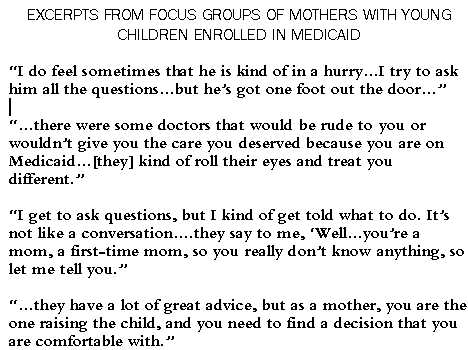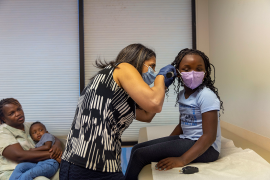A new report by The Commonwealth Fund reveals significant gaps in communication between pediatricians and mothers of young children who get their health care through Medicaid. The study points to problems such as information being inappropriate to a mother's age or experience, or being presented in a culturally insensitive manner, or failure to provide explanations for advice given. The study, reported in Child Development and Medicaid: Attitudes of Mothers with Young Children Enrolled in Medicaid, by Susan Kannel and Michael J. Perry of Lake Snell Perry & Associates, assessed mothers' experiences in receiving health care services that can help them raise and care for very young children.
"New research has shown the importance of the first three years of life to a child's lifelong healthy development," said Karen Davis, president of The Commonwealth Fund. "Policymakers and providers need to work together to design a health care system that will maximize the value of the time parents spend with pediatricians to ensure they are getting the information and help they need to give their children the best start in life."
The study consisted of focus group interviews with mothers of children under age 4 enrolled in Medicaid in four states. These states are testing new initiatives to build state Medicaid agencies' capacity to deliver developmental services, with support from the Fund's Assuring Better Child Health and Development (ABCD) program. The groups were held to gain an understanding of mothers' views towards services provided by Medicaid by asking about the quality of their current pediatric services, the quality of the communication between parent and pediatrician, their preferred ways of receiving information about parenting, concerns about their child's development, and their reactions to the types of services and models tested by the sites.
Parents in the study expressed interest in and knowledge of child development issues. However, there were many gaps in knowledge-for example, some mothers believed that bringing their children in for immunizations was sufficient for all their health and developmental needs. Overall, participants expressed positive views about their access to pediatric preventive and well-child health care, while pointing out barriers to effective communication of information on development issues.
 Mothers without a regular pediatrician were more likely to have gaps in knowledge about child development, and to feel their doctor does not spend enough time with them. "Many mothers trust the information they get from their pediatricians, but it is important to develop an ongoing, stable relationship," said Karen Scott Collins, M.D., vice president at The Commonwealth Fund. "Mothers want and need advice from experts on child health and development, but they have to feel comfortable discussing these issues with their child's doctor."
The report highlights recommendations to help pediatricians and public health programs provide better services:
Mothers without a regular pediatrician were more likely to have gaps in knowledge about child development, and to feel their doctor does not spend enough time with them. "Many mothers trust the information they get from their pediatricians, but it is important to develop an ongoing, stable relationship," said Karen Scott Collins, M.D., vice president at The Commonwealth Fund. "Mothers want and need advice from experts on child health and development, but they have to feel comfortable discussing these issues with their child's doctor."
The report highlights recommendations to help pediatricians and public health programs provide better services:
- Provide information appropriate to the mother's age, parenting experience, language, and cultural background.
- Do not tell parents what to do without explaining why. Presenting child development information in the right way-by showing respect for a mother's experience and opinions, by facilitating a give-and-take discussion, and providing explanations and reasons for the advice given, can increase the likelihood that mothers will follow the advice.
- Pay attention to mothers' well-being in addition to the child's.
- Include fathers and other family members involved in caregiving.
- Create easy-to-access educational tools such as videos and charts, and use the Internet. Make materials easily accessible, but avoid information overload.
- Provide opportunities for interaction with other mothers.
- Offer a home-visiting program that is responsive to mothers' needs. Work with mothers to identify the best time for an initial visit.
- Pediatricians should continue to be the main source of information about child development but could improve their interaction with mothers by spending more time with them and having a team approach with trained child development specialists in the practice providing information to parents.
- Help mothers form relationships with pediatricians and ensure continuity of care.
- Extend benefits for mothers after birth to address maternal health problems, including depression.
- Offer additional expertise such as visiting nurse programs and child development experts in doctors' offices.
- The mother should identify the best time for an initial visit. This may not be right after birth, when they might have help.
- Create media campaigns about the benefits of comprehensive well-child care.
- Raise awareness among clinicians about importance of their role in child development education.
- Identify linkages with other programs serving the same population, such as the WIC program.
- Tailor programs to age, experience, culture, and language, and establish standards for interpreters.


